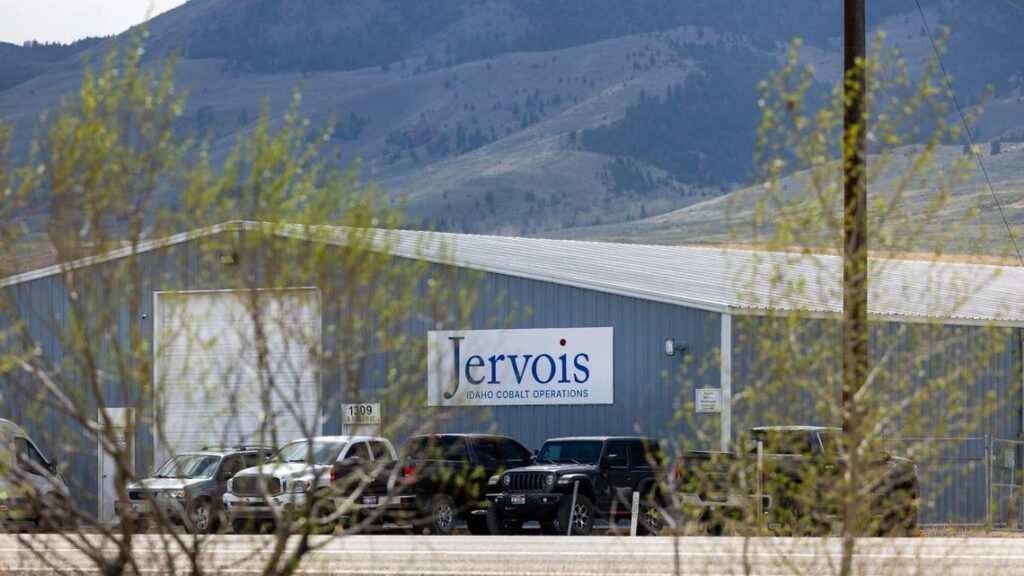The Australian owner of a cobalt mine in Central Idaho plans more extensive study of cobalt at a remote site in the Salmon River Mountains, and the potential for a cobalt refinery, after securing $15 million from the U.S. Department of Defense.
The funding agreement, which Jervois previously announced was coming, does not compel the company to open its mine, though a company official said the funds may make it easier to restart production. After announcing the mine was near completion to fanfare last fall, Jervois abruptly suspended operations in March because the price of cobalt tumbled. Jervois has said it expects the price to rebound.

The mine near Salmon is within the Idaho Cobalt Belt, which contains some of the largest cobalt deposits in the U.S. If it starts production, the mine would be the only primary cobalt mine in the country — a fact with heightened importance now because the element is a common ingredient in electric vehicle batteries.
The funding from the executive branch tasked with overseeing the U.S. Armed Forces emphasizes the importance of cobalt, which is also used in munitions and “high-temperature aerospace alloys,” according to the Department of Defense. The mineral also has national security implications, as most mining and refining is controlled by China.
“Investments such as these execute President Joe Biden’s focus on strengthening supply chains for critical minerals for large capacity batteries,” Laura Taylor-Kale, assistant secretary of defense for Industrial Base Policy, said in a news release this month. Industrial Base Policy oversees the industrial supply of military weapons systems.
Jervois has estimated its mine could supply 10% of current U.S. demand for cobalt. The company has a pending application with the Department of Energy for a loan to help pay for a cobalt sulfate refinery for “the nascent but rapidly emerging U.S. electric vehicle industry,” according to a news release.
In April, the company also announced that it could benefit from direct financing from the U.S. government.
The Department of Defense did not immediately respond to a request for comment.
Demand for cobalt rises, but with uncertainty
As car manufacturers ramp up production and sales of electric vehicles, demand for cobalt is expected to double by 2030 by some estimates. China processes close to 80% of the world’s supply of cobalt and is expected to soon control half of its production.
At the same time, other types of battery chemistry that do not use cobalt — which is expensive to procure — are competing with the mineral as automakers race to find cheaper materials to make cars.
That means there is some doubt about how much cobalt will be needed in a less carbon-intensive economy.
“The projected demand for cobalt varies widely depending on the assumptions that you make about technology, speed of adoption and other sorts of things,” Elizabeth Holley, mining engineering professor at the Colorado School of Mines, recently told BNN Bloomberg. “So that is a big unknown.”
In an interview, the mine’s executive general manager Matt Lengerich said the inflow of military funding would expand Jervois’ understanding of the cobalt ore near Salmon and modernize the company’s mapping of another nearby cobalt deposit that it controls. That work could bring the company closer to reopening its mine.
“While we’re in suspension, it allows us to expand that (cobalt) resource, and so it certainly does help in the effort to restart,” Lengerich said.
Funding brings study on cobalt refinery
The funds will also finance a “bankable feasibility study” for a cobalt refinery, of which there are none in the U.S.
The study would examine the potential costs, profits and logistics of a cobalt refinery’s business plan, Lengerich said, as well as its potential location. Putting a refinery at the mine site itself would be “highly unlikely” because of its remoteness, though Idaho is a possibility, he said.
But Lengerich added that the company expects that such a refinery would last for decades, whereas the Salmon mine was permitted for only seven years.
“You’re really looking at locating an asset that you expect to be there for decades,” which could process cobalt from the Idaho mine or elsewhere, he said.
Jervois also owns a cobalt refinery in Finland, and the company had planned to send the ore mined in Idaho to another refinery in São Paulo, Brazil — an expensive prospect.
“The U.S. is having an identity crisis: What kind of miners do we want to be?” Holley told BNN Bloomberg. “Do we really want to domestically produce, mine and refine battery materials? And the Idaho Cobalt Belt is a great test case for that. If we wanted to do the whole thing here, we would need to develop infrastructure to do so.”
She noted one refinery is under construction in Missouri, but said the Idaho ore would need special processing.
When could the cobalt mine reopen?
Jervois has not set a firm timeline for getting the mine online, and has pointed to the cobalt markets as its benchmark.
“There’s still scenarios under which we can see a restart as early as 2024,” Lengerich said. “And it could be later than that.”
___
© 2023 Idaho Statesman
Distributed by Tribune Content Agency, LLC.



